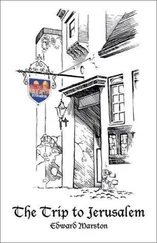Sivi was then nearly seventy. He was unusually tall for a Greek, as Yanni had also been, both of them having inherited their large strong frames and deep blue eyes from their father, a famous leader of the Greek war for independence who had come from an isolated corner of Crete where the people were said to be direct descendants of the Dorians. The fierce old man had married twice late in life, fathering Sivi when he was in his fifties and Yanni when he was well over eighty.
So nearly thirty years had separated the half-brothers and much else as well, Yanni a warring patriot who had lived by the Cretan war cry against the Turks, freedom or death, Sivi a sophisticated arbiter of art and society at his famous teas in Smyrna, where everyone seemed to turn up sooner or later.
In the past year Maud had written Sivi only once, soon after returning from Aqaba, a short note saying she had fallen deeply in love in Jerusalem. But later when her fears had begun to paralyze her she hadn't dared to write. So Sivi had no way of knowing who was at the door on that April afternoon when he answered the bell and found her standing in the rain, thin and wasted with a baby in her arms, one battered suitcase at her feet.
Maud had memorized what she was going to say but the words left her the moment she saw Sivi suddenly towering above her. She couldn't speak. She broke into tears.
She didn't remember everything that happened after that. Sivi embraced her and swept her inside, delivered the baby into the care of his housekeeper and helped her upstairs, called Theresa, his French secretary, to draw a bath and provide new clothes, talking happily all the while in a warm excited voice as if the visit had been planned for months, as if the only misfortune on that dark April afternoon was that it had been raining when she arrived.
Later they sat with cognac in front of the fire, Sivi's deeply lined face all smiles as he wagged his massive head and chatted on about Smyrna and his recent adventures, never once mentioning Bernini or alluding to Maud's life during the last year, simply accepting her presence in his home and delving into ever more elaborate anecdotes to distract her.
Constantinople, 1899.
While Sivi was entertaining a young sailor in his hotel room the sailor's regular lover, a hulking customs inspector, had arrived and begun chopping down the door with an ax, shouting that he was going to kill Sivi. The only escape was the window and the door was giving way so fast there was no time to dress.
With an open umbrella over his head to serve as a parachute, Sivi went sailing out the window in a long red nightshirt and nothing else, the hotel room having been cold enough to warrant a nightshirt no matter what activities were under way.
The nightshirt billowed up, revealing his nakedness to the pedestrians below. And what was worse, it made it impossible for him to see where he was going.
To not even know, intoned Sivi, gesturing extravagantly, what manner of grave I was going to fall into? A diabolical trick of fate.
As it happened he found himself landing on his bottom in a pool of water, raising a great spray, in the back of a madly careening water wagon driven by an Armenian whose horses had gone out of control, attacked by a yapping dog. As the customs inspector shook his ax from the hotel window the wagon thundered away up the street followed by the noisy dog, Sivi sitting up to his waist in the water and still holding his umbrella high, his nightshirt spread around him like a gigantic red water lily, smiling and nodding pleasantly at the astonished spectators on the sidewalks who had seen him come sailing out the window at precisely the right moment to make good his escape.
Or Salonika, 1879.
Being given to pranks in his youth, Sivi had not appeared in his box at the opera until just before the end of the first intermission, when he presented himself dressed in an enormous red hat spilling with roses, long red silk gloves and a flowing red gown complete with an impressive bustle, a fake ruby brooch of extraordinary size fitted into the cleavage of his chest.
Whispers were rampant through the tiers of the opera house but Sivi kept his eyes fixed on the stage, ignoring everyone, slowly stroking his thick moustache with a forefinger.
The curtain rose. Siegfried marched to the middle of the stage and spread his arms to proclaim a mighty deed, whereupon Sivi swept dramatically to his feet and thundered out the first bars of the solo in a basso profundo that not only shocked Siegfried into silence and stunned the audience but immediately brought the curtain crashing down.
And Alexandria and Rhodes and Rome, Venice and Cyprus and Florence, Sivi recounting tales from over the years to amuse her until Maud was laughing in spite of herself, whispering as he kissed her goodnight that this was expected to be an especially beautiful spring in Smyrna, his way of saying she was welcome to stay as long as she liked in his villa by the sea.
And later that night as she lay sleepless in bed, sobbing quietly in the darkness as the rain beat down on the house, she marveled anew at this gentle courtly man who had somehow come to accept everything in life, and everyone, without asking why it should be so.
At peace. She wondered if such serenity would ever be hers.
She met Munk for the first time in June and found him to be so close to Sivi as to be almost his adopted son, which surprised her initially because she herself had known Sivi so long and never heard him mention Munk. But then she remembered that had always been Sivi's way. So flagrant in his own behavior, he was yet extremely discreet when he came to others and never talked about one friend to another. And in the same manner, Munk was surprised to learn that Sivi had a sister-in-law.
And an American with beautiful green eyes at that, said Munk, taking Sivi's arm. Why didn't you ever tell me, you old sinner?
Sivi wagged his head and smiled wickedly.
Tell you? Why should I have told you? I didn't want to complicate your lives. A handsome young widow from the New World? An itinerant bachelor from Budapest? No, I would never take responsibility for initiating such an enterprise. Who knows what might come of it? But the truth is my closets are seething with relatives and friends neither of you have ever heard of. The condition is a common one as you'll come to understand when you get to be my age and have a long and varied background behind you. It's just extraordinary how events over the decades can multiply the people in your life. And even when you're just out for a stroll and strictly minding your own business. Come now, this way for tea. Young Munk is bursting to tell us something. The signs are unmistakable.
In fact Munk had come to Smyrna to tell Sivi of his recent conversion to Zionism, and he could talk of nothing else as they all sat together in the garden behind the villa that first afternoon, Sivi nodding paternally at Munk's enthusiasm over what would be done in Palestine, Sivi's secretary Theresa appearing indifferent. But by then Maud knew the young Frenchwoman well enough to understand her exaggerated calm.
When did they stop being lovers? she asked Sivi later, when the two of them were alone and he was preparing to go out for the evening. Sivi smiled happily and came back to sit down beside her, more than ready to tarry, as always, when the talk turned to love.
But my dear, he said, patting his closely cropped white hair, they still are lovers.
I don't think so. He may not know it yet, but she does.
You mean his new interest in politics, a homeland for his people and so forth?
Yes.
Sivi waved his hand majestically.
Nonsense. Passion in one sphere induces passion elsewhere. Our friend Munk has been looking for a cause for years, long before that stately old Empire of his began to crumble in the cold damp mists of central Europe. The blood of the great Johann Luigi Szondi flows in his veins, the indefatigable spirit of exploration, and now that Munk has found his cause on the shores of the Eastern Mediterranean, his flame will burn ever more brightly casting light in all corners. Love, in short. A lifetime to come exploring the landscape of love. The Mediterranean has him at last.
Читать дальше












